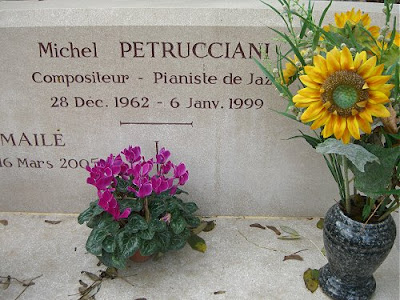This is the future of classical music

A classical chamber orchestra on the opening night of the London Jazz Festival with a Tunisian oud player? Purists on every side must have been steaming from all orifices. But this is the future of music. And it works, as this exhilarating fusion showed.Richard Morrison in The Times gives the Britten Sinfonia concert at the London Jazz Festival a well-deserved five stars. I don't normally reblog complete reviews. But this could be the end of Western art music.
Nothing demonstrated that better than Arvo Pärt's 1977 minimalist classic, Fratres. It opened the concert, played “straight” by the excellent strings of the Britten Sinfonia under Joanna MacGregor's (below) direction, with its elegiac refrain rising and falling over a drone like a sombre ritual. Then, at the end, it was repeated as an encore - but with a difference. This time the great Dhafer Youssef (above) and the virtuoso percussionist Satoshi Takeishi added a subtle, shadowy patina of Arabic cries and whispers. It was as if the ancestral Estonian modes summoned by Pärt in Northern Europe had stirred strange, kindred echoes in North Africa. Pure musical magic.
And it wasn't the only heartstoppingly beautiful moment in this “East meets West meets North meets South” programme. Youssef's own pieces - gentle-spirited, syncopated improvisations in sophisticated metres, showcasing his stunningly pure voice (electronically enhanced with overlapping echoes), his shofar-like falsetto, and dextrous fingerwork on his Arabic lute - gained a dimension, sonically and expressively, when accompanied by the strings. Meanwhile, Takeishi, squatting beside his exotic drums and cymbals, supplied deft and supple solos, as did the ubiquitous jazz bassist Peter Herbert. And the Britten Sinfonia brought to the party some cool culture-hopping of its own. With MacGregor at the piano and Jacqueline Shave supplying fleet-fingered fiddle solos, it played three of MacGregor's exuberant arrangements of songs by the renowned Romanian gypsy singer Gabi Lunca.
Then Shave led two evocative pieces by Bartók. The Burletta from the Sixth Quartet was properly savage. But Pe Loc from the Romanian Folk Dances was the real show- stopper, with Youssef's voice and Takeishi's brushed drums again adding a mysterious and mystical subtext. No, Bartók didn't write it like that. But yes, that dedicated follower of folk fashion would have loved the intrusion.

Any copyrighted material on these pages is included as "fair use", for the purpose of study, review or critical analysis only, and will be removed at the request of copyright owner(s). Report broken links, missing images and errors to - overgrownpath at hotmail dot co dot uk








Comments
You may be interested that last season, 2007/08, the esteemed Library of Congress chamber music series continued to try to move beyond its 80 year old ‘classical’ tradition by opening with Moscow’s Sretensky Monastery Choir and then the Tunisian-born singer and oud virtuoso Dhafer Youssef, who now lives in Vienna, Austria. [Increasingly, embassies are co-sponsoring concerts at the Library of Congress.]
That second concert was a huge success and was, in my opinion, one of the most successful in the Library’s seven-year long attempt to reach out beyond traditional European and American chamber music to the areas of jazz and world music (and also rock and roll – with mixed success so far; although it has now been reported that Stevie Wonder has accepted a Library of Congress commission, following Gyorgy Kurtag.)
Dhafer Youssef’s song and oud concert remains perhaps my most vivid Library of Congress memory of the past several years (now challenged, perhaps, by soprano Tony Arnold and pianist Jacob Greenberg’s performance, a fortnight ago, of Olivier Messiaen’s almost hour long song cycle ‘Hawari’ based upon Quechuan folk poetry -- which is one of the recovered gems from the year-long Messiaen celebration.)
http://www.loc.gov/rr/perform/concert/0708-schedule.html